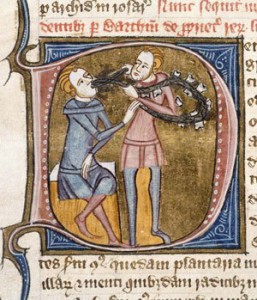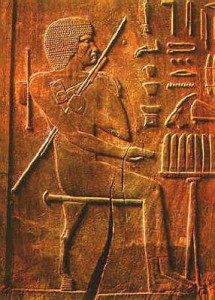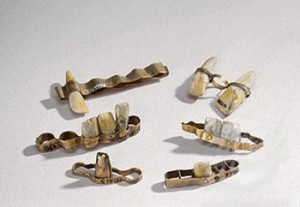Ancient Dentistry: Do you really want to know? Posted by Brittany Britanniae on Feb 17, 2016 in Latin Language, Roman culture
Salvete Omnes (Hello Everyone!),
I hope everyone had a wonderful Valentine’s Day filled with love and chocolate! But, I wonder how many of us overindulged on the candy and sweets?
DISCLAIMER: THIS POST WILL FEATURE EXAMPLES OF ANCIENT DENTISTRY. IMAGES MAY NOT BE SUITED FOR EVERYONE.
So I was hoping as a contrast to my making a Roman Dessert post, that this post on Ancient Dentistry will make us grateful for modern dentistry and encourage to keep healthy habits with our teeth!
Timeline

Tooth Worms were a common belief well beyond antiquity.
5000 BC – A Sumerian text of this date describes “tooth worms” as the cause of dental decay. Evidence of this belief has also been found in ancient India, Egypt, Japan, and China. The legend of the worm is also found in the writings of Homer, and as late as the 1300’s AD the surgeon Guy de Chauliac still promoted the belief that worms cause tooth decay.
2600 BC – Death of Hesy-Re, an Egyptian scribe, often called the first “dentist.” An inscription on his tomb includes the title “the greatest of those who deal with teeth, and of physicians.” This is the earliest known reference to a person identified as a dental practitioner.

Cedar wood panel depicting Hesy-Ra.
1800 BC – In the 18th century BC, the Code of Hammurabi referenced dental extraction twice as it related to punishment. Examination of the remains of some ancient Egyptians and Greco-Romans reveals early attempts at dental prosthetics and surgery.
1700-1550 BC – An Egyptian text, the Ebers Papyrus ( here and here), refers to diseases of the teeth and various toothache remedies.
500-300 BC – Hippocrates and Aristotle write about dentistry, including the eruption pattern of teeth, treating decayed teeth and gum disease, extracting teeth with forceps, and using wires to stabilize loose teeth and fractured jaws.

Ancient Roman bas-relief of a dentist examining a patient, A Profile of Ancient Rome. A Getty Publication.
100 BC – Celsus, a Roman medical writer, writes extensively in his important compendium of medicine on oral hygiene, stabilization of loose teeth, and treatments for toothache, teething pain, and jaw fractures.
166-201 AD – The Etruscans practice dental prosthetic using gold crowns and fixed bridgework usually held together by gold wire or strips.

‘The Etruscans, who predated the Romans, practiced making dentures and implants as early as the 7th century BCE. They used gold wires, gold strips, and gold rivets in their intricate dentistry.
Tools:
- The first toothbrush, which is made of bristles, was invented during the Chinese Tang Dynasty (619-907).
- When it comes to toothpaste, the ancient people used pastes made from various herbs. In ancient Greece, the toothpaste is made out of coral powder, iron rust, pumice, talc, and alabaster. The toothpaste of ancient Romans were made from ground eggshell and fresh honey.
- The first artificial teeth were carved from animal bones and eventually wood.
Greek and Latin Suffixes and Roots for Dental Terms:
| Prefix/Suffix | Definition | Example |
|---|---|---|
| -algia | pain | odontALGIA = tooth pain |
| -a | without | Acellular = having no cells |
| arth- | joint | ARTHOscope=an instrument to see inside a joint |
| dent, odont | tooth or teeth | ODONToma = tumor composed of tooth structures |
| -ectomy | excision | appendECTOMY = excision of the appendix |
| -emia | blood | hyperEMIA = above normal amount of blood in an a tissue |
| endo- | within | ENDOdont =inside a tooth |
| -gen- | beginning, produce | pathoGENic = disease producing |
| gingiv- | pertaining to the gums | GINGIVitis = inflammation of the gums |
| glyc- | sugar | GYLColysis = sugar dissolving |
| hyper- | over, excessive, above | HYPERmobility= more mobility than normal |
| hypo- | below, under, deficient | HYPOthermia = below normal temperature |
| -ia, -iasis | condition | odontalgIA = condition of tooth pain |
| infra- | below | INFRAorbital = below the eye |
| inter- | between | INTERcellular = between cells |
| intra- | within | INTRAoral = within the mouth |
| itis | inflammation | periodontITIS = inflammation of supporting structures of teeth |
| lingu- | pertaining to the tongue | LINGUal surface = the surface closest to the tongue |
| -logy | study of | pathoLOGY = study of disease |
| -lysis | destruction, dissolving | glycoLYSIS = dissolving sugar |
| muc- | mucous | MUCositis = inflammation of mucous membrane |
| neo- | new | NEOplasm = new growth |
| -oid | resembling | wordOID = resembling a word (this is not a real word) |
| -oma | tumor | odontOMA = tumor composed of tooth structures |
| -osis | condition, disease | periodontOSIS = condition of the periodontium |
| -path, -pathy | disease | PATHOlogy = study of disease |
| peri- | around | PERIoral = around the mouth |
| perio- | supporting structures of the teeth | PERIOdontal = involving the supporting structures of teeth |
| -phil- | love | acidoPHILic = acid loving |
| -plast, -plasty | repair, form, grow | gingivoPLASTy = repair of the gingiva to functional form |
| post- | behind, after | |
| py | pus | PYogenic= pus producing |
| -rrhea | burst forth, pour | sialoRRHEA = excessive flow of saliva |
| -scope | instrument used to view | arthoSCOPE = an instrument to see inside a joint |
| sial- | saliva | SIALorrhea = excessive flow of saliva |
| -stomia | mouth | xeroSTOMIA = dry mouth |
| super- | above, excessive | SUPERnumerary = excessive number |
| supra- | above | SUPRAgingival = above the margin of the gums |
| xero- | dry | XEROstomia = dry mouth |
asdfas

Build vocabulary, practice pronunciation, and more with Transparent Language Online. Available anytime, anywhere, on any device.
About the Author: Brittany Britanniae
Hello There! Please feel free to ask me anything about Latin Grammar, Syntax, or the Ancient World.




Comments:
JOSEPH:
very interesting thank you
James Bergman:
This is really interesting. I am really glad that toothpaste no longer has rust or egg shells in it. I don’t think I would be a big fan of brushing my teeth if it did. I’m also really glad that dentists now know more about fixing teeth than just holding them in place with wires.